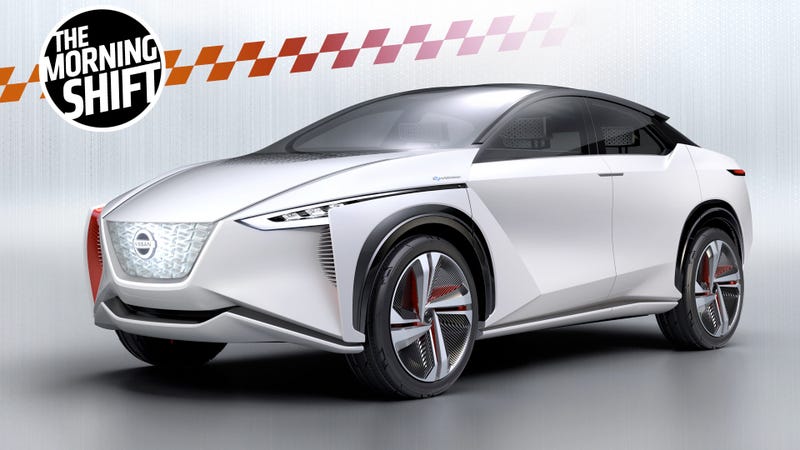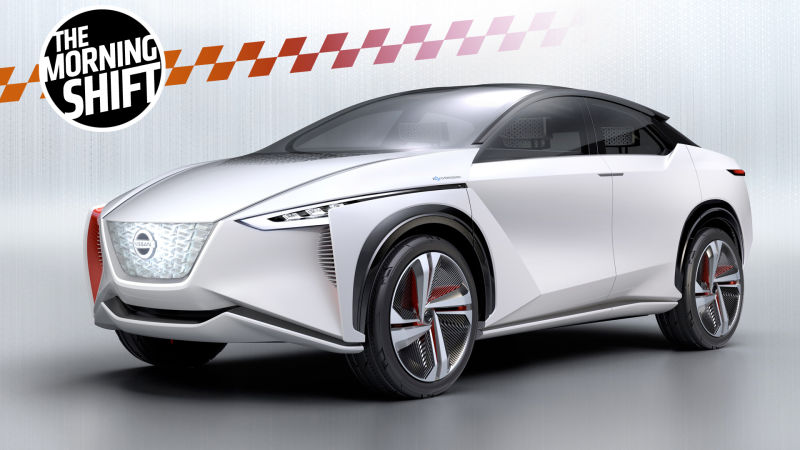
Good morning! Welcome to The Morning Shift, your roundup of the auto news you crave, all in one place every weekday morning. Here are the important stories you need to know.
1st Gear: Nissan Thinks It Can Sell One Million ‘Electrified’ Vehicles By 2022
The company will also introduce eight new models by then, it said Friday, in a plan that they are calling “M.O.V.E.” What does “M.O.V.E.” stand for? Here’s a slide from a Nissan presentation:
OK.
Here’s more from Automotive News:
Japan’s No. 2 carmaker said it will also bring 20 models with autonomous driving technology to 20 markets by then and reach 100 percent connectivity in all new Nissan and Infiniti models.
The new targets flesh out the M.O.V.E to 2022 midterm plan unveiled by CEO Hiroto Saikawa last fall for the six years running through the fiscal year ending March 31, 2023.
As part of the plan, Nissan wants to lift global annual revenue during the period to 16.5 trillion yen ($160.0 billion), from the 12.8 trillion yen ($120.0 billion) booked in the fiscal year that ended March 31, 2017. It also wants a sustainable operating profit margin of 8 percent.
Advertisement
But…
2nd Gear: Are Electric Cars Really Our Future?
Bloomberg says that most auto executives privately say, “Nah.” In what sounds like a mostly pointless pissing contest with Elon Musk, most auto executives think that, well ACTUALLY, fuel-cell powered cars will win out in the end, because you don’t have to wait very long to refill their tanks, as opposed to electric cars, which have longer recharging times.
Advertisement
The hold up has been governments, which have tended to incentivize electric cars over their fuel-cell counterparts, most notably in China.
“It almost feels like a Betamax versus VHS moment,” said Justin Benson, KPMG’s U.K. head of automotive, referring to the war between rival videotape formats in the late 1970s that VHS, considered technologically inferior, eventually won. “It’s not beyond the wits of man to move to hydrogen relatively quickly, if organizations wanted to do it.”
There are pockets of investment. Japan wants fuel-cell cars and buses made by its automakers to transport athletes during the 2020 Tokyo Olympics, and California has spent $100 million building fueling stations. But China, the biggest car market, is going full tilt in the switch to battery-powered cars to combat air pollution.
Advertisement
Infrastructure is also an issue, with many more charging stations than hydrogen stations around at the moment, but in the long-long-term, fuel cells are still expected to win out.
While they’ll be stuck at less than 2 percent of automobile sales through 2030, fuel-cell cars will eventually be vindicated, according to forecasts of the European Climate Foundation, reaching 10 percent by 2035, 19 percent by 2040 and 26 percent by 2050.
That’s why many carmakers are keeping a toe in the H2O. At the consumer electronics show in January, Hyundai unveiled a fuel-cell powered SUV, the Nexo, which it says can run for up to 800 kilometers—40 percent more maximum range than Tesla’s Model X.
Advertisement
Of course, this is all an extremely dumb argument. If automakers wanted there to be hydrogen infrastructure so they could sell hydrogen cars, they would just build it themselves. That’s what Tesla did with the Supercharger network.
Also, the next-generation of fast-chargers are aiming for a target of an 80% charged car in a mere five minutes. So soon this pointless arguing will be extra pointless.
3rd Gear: Florida’s Still Cool With Autonomous Testing After Deadly Uber Crash
The state already has some of the most lax laws in the nation when it comes to autonomous vehicle testing. And they have no plans to change that following Sunday’s deadly incident in Tempe Arizona.
Advertisement
From Bloomberg:
Jeff Brandes, the Florida state senator who has led the local effort to become a hotbed of autonomous vehicles, said in an interview this week he sees no reason to add tougher regulation to self-driving cars. Florida already allows carmakers and technology companies to run autonomous vehicles without a driver, and the companies aren’t required to report problems such as traffic accidents.
Lax oversight of self-driving vehicles came under new scrutiny on March 18 after an autonomous car being tested in Tempe, Ariz., by Uber Technologies Inc. stuck and killed a pedestrian. As a result, Uber, Toyota Motor Corp. and self-drive startup NuTonomy have said they would suspend testing.
“We have to remember that there was a safety driver in the vehicle,” Brandes said of the pedestrian death in Arizona. “The technology and the driver couldn’t react fast enough to avoid the accident. I don’t think this changes anything for the state of Florida.”
Advertisement
Counterpoint: Uber has no damn business testing autonomous cars.
4th Gear: Automakers Are Still Mad About Possible Trump Tariffs
The tariffs, which are bad, haven’t hit the auto industry (so far) but a looming trade war with China, Europe, and pretty much everyone else has automakers extremely worried.
Advertisement
From Bloomberg:
Automakers are continuing to lobby Trump administration officials to minimize the tariffs, lest the Chinese government retaliate against their own efforts to expand in the world’s largest auto market.
“We recognize the issues the President is trying to address but there are better ways to go about this,” said John Bozzella, CEO of the Association of Global Automakers, based in Washington. “At the end of the day a trade war will hurt American producers and consumers.”
[…]
The U.S. has an $8.9 billion surplus on cars with the Chinese but a $1.5 billion auto trade deficit overall when counting parts, according to data from the U.S. Census bureau. The total trade deficit with China was at least $375 billion last year, with Trump pegging it closer to $500 billion.
“We encourage both governments to work together to resolve issues between these two important economies,” Ford Motor Co. said in a statement.
Advertisement
5th Gear: There’s A Lot Of Used Cars On The Market, Driving New Car Sales Down
That’s according to J.D. Power, though they also say that low prices for new cars will help offset the impact.
Here’s Automotive News:
J.D. Power forecasts U.S. new-vehicle sales of 13.8 million this year, [Thomas King, senior vice president of J.D. Power’s data and analytics division] said, down roughly 200,000 from a year ago.
Vehicle prices are averaging $32,200 so far this year, up $500 from the same period in 2017. Sales of vehicles less than $20,000 have fallen 19 percent so far this year, while sales of vehicles $40,000 or more have risen 4 percent.
Customers are on track to spend $444 billion on vehicles this year, roughly the same as last year, King said.
Advertisement
Some 3.7 million cars will come off lease this year, according to J.D. Power, or around 300,000 more cars than last year. Another stat tucked away in that story that kind of blows my mind?
Sedans represent 32 percent of automakers’ mix so far this year, down from 36 percent a year ago, as customers continue to choose utilities and pickups.
A four percent decrease in just a year’s time! Sheesh. Sedans will soon become cars for young cool people also into things like “cassette tapes” and “CDs.”
Advertisement
Reverse: Craig Breedlove, Who Liked The Cars To Go Quick, Is Born
Neutral: Do You Think In 50 Years We’ll Be Driving Electric Cars Or Fuel-Cell Cars?
Advertisement
Or will we all just be dead.













